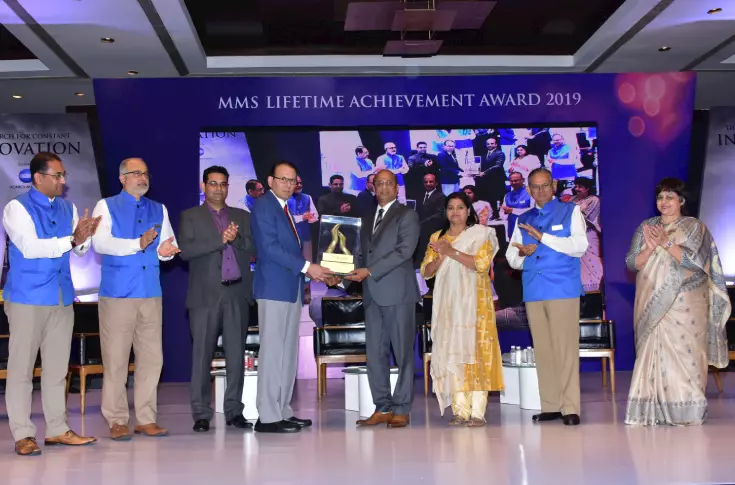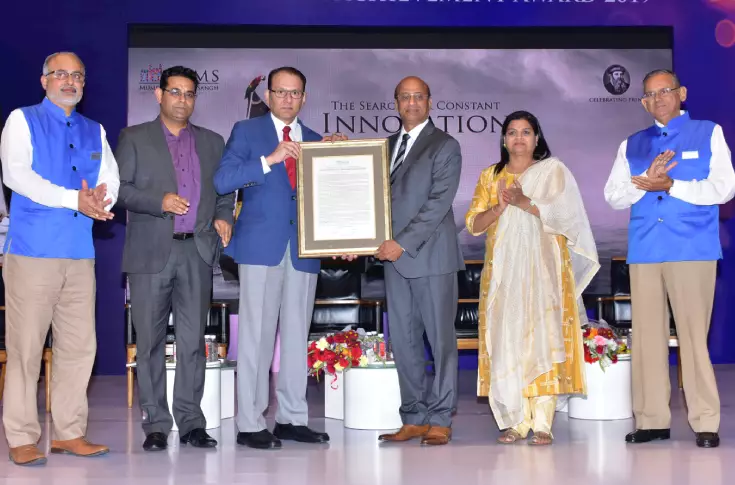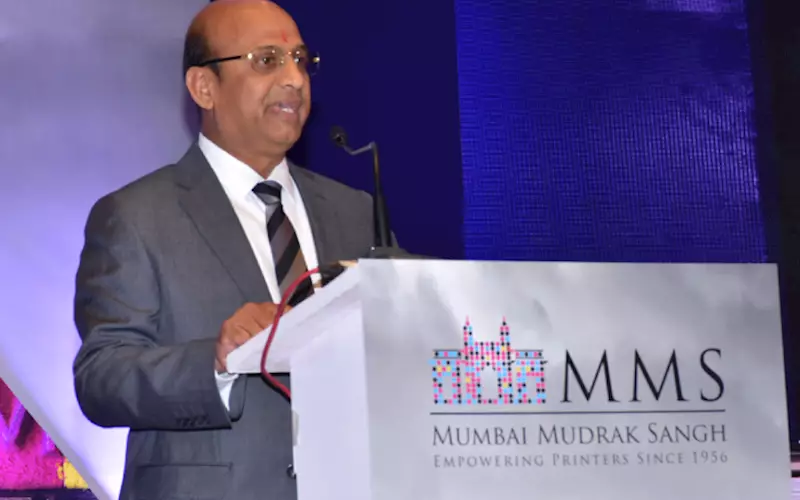The MMS Award for Line O Matic’s Uday Patel
Line O Matic's founder and owner Uday C Patel was the recipient for the Lifetime Achievement Award bestowed by the Mumbai Mudrak Sangh. He delivered a short speech at the Sahara Star in Mumbai in which he said, "I am thankful to the Mumbai Mudrak Sangh for this honour."
Excerpts from an exclusive interview with Medha Virkar, Immediate Past President of MMS.
13 Mar 2019 | By Ramu Ramanathan
Line O Matic success:
What do our customers want? They want cost-effective quality. We are providing that to our customers, and that is our success. We have achieved German quality at Chinese rates. Thanks to our efforts, we have very few foreign-made machines installed in India in notebook manufacturing. This, I think, is our success.
Early days:
I did not choose the business; I joined my father's company at an early age. My father, Chhabildas Patel, used to explain the machines to me. He made us work on every machine to make us understand the workings and the functions of every machine. He put us through rigorous training; all that hard work is paying off, now. In the meantime, I went to Drupa in Germany with my brother. We saw there a whole new world of print machinery. This was about three decades ago.
That's where we thought if the West can build such machines, why can we not develop and make them in India? Soon after returning to India, we decided to develop our products. My father used to make hand ruling machines; from that small factory, I began working. I convinced my father for expansion of our factory, raised finance from the banks, and that's how the story began.
First machine:
First, we produced a roll-to-sheet flexo ruling machine. We have evolved that machine from 100 m per minute to now 500 m per minute; we kept improving our machines. We are the only machinery manufacturer in India making roll-to-book machines.
Fair pricing:
We are lucky enough that we have no competition in India, and yet I set my machine prices at fair value. I don't want to take undue advantage of the position we have created for ourselves. It is these fair practices, including the excellent quality of our machines, that has helped us expand to over 65 countries.
Hurdles:
One has to develop a good team. One has to design a robust platform for the products. However, my priority was quality from the get-go. If we pay attention to quality, the product will be a success.
Profitable machines:
In the notebook industry, each unit employed over 200 people. Also, productivity was lower compared to the other markets in the world. It was all a laborious production process. Because of manual work, the workers faced tremendous pressure – the stress of production as well as physical stress, such as they would feel pain in their hands with repeated ruling operations. It was these pain points that we decided to address. If we had not made automated machines for the industry, India would have faced a grave production challenge.

Key to success:
I had to make sure that my machines are profitable to my customers. The industry was growing at 14-15% annually, and the country's population was growing faster. If we had not made these machines, how could we achieve the notebook production to match increasing demand for the young nation that was emerging? How could we possibly educate a young India without notebooks and books? For the machinery, and perhaps, for the notebooks, we have had to depend on imports. With our machines, we not only saved the foreign currency on the imports of machines but many of our customers, the notebook manufacturers who use our machines, are exporting notebook products from India.
Try, try, try again:
When I started working on the development of the roll-to-book and cut size sheeter machines, until 2002, we did not have much success. I remember we had to break our unsuccessful machines into pieces. All these failures were heartbreaking but with each one of them we learned and improved our designs and development process.
Line O Matic's service support:
We give free service for the first two to four years, depending on the machines. The critical electrical parts in all our machines are sensor-equipped. We continuously monitor the data at our plant here in Ahmedabad, Gujarat. No matter where the machine is installed, in India or around the globe, we know exactly how it is running and what is wrong with it. Whenever there is something wrong with the machine, for example, a motor is too hot, the compressor is faulty, the oil levels are low, the machine reports the issues to our central control room and also to the owners and the supervisors via a message on their mobile. This technology helps in preventing many breakdowns and improves preventive maintenance.
In-house training:
When we began manufacturing our machines, they were good; just like Mercedes cars. They are good, but if the driver is not skilled, the vehicle will not be able to perform well. Likewise, if my machine’s operator is not good, the machine will not deliver at its best. A lot of our customers did not have operators for our machines. That time we trained youth from many parts of India at our factory. We hand-picked youth who were ready for hard work and were keen to learn to operate our machines. After training, over 250 youth were trained as operators who were working in over 150 cities across India as operators of our machines.
There are hundreds and thousands of such youth around many villages in our country. They may not have access to formal education, but they may be given an opportunity to learn and to grow. If I think that the person is ready to work hard, we train the person as the operator of our machines. I am proud that eight out of 10 people we take in for training succeed and become good operators of our machines. We train them rigorously; some learn in six months; some may take up to two years, but we keep teaching them provided they consistently work hard.
Hardwork lessons from father:
We used to stay in Parekh Building in Mumbai. My father and uncle had an office in Fort; they had a trading business. When I was little, we moved to Ahmedabad. It was during my school days; perhaps at the age of 16-17, I began going to the factory with my father. I used to observe in the beginning. I keenly observed, with sharp focus.
Gradually, my father made me work on each machine, grinding machine, lathe machine, for example. It was this hands-on experience that made me understand and appreciate the hard work. Also, it made me appreciate the work of our staff and workers, and I could connect with them. I started working from the ground up, and thanks to my father's watchful and strict training for about 15-20 years that has kept me grounded and rooted to the people around me.
What are the machines:
I consider all my machines as my babies. When I send them to their new home, I send accessories, supplies, for them to run and serve the customer. How would that be possible? Only if my machine, my daughter, is taken care of; is healthy and happy all the time, and she brings happiness to her new family. Undoubtedly customers take care of our machines. However, as a passionate and involved developer and manufacturer of these machines, it is my duty to ensure the best condition of our machines, even when they left our premises.
Just as I expect my daughter to be a good daughter-in-law and serve the elders in the family, and spread happiness in her new house, I expect my machines to be of excellent service to my customers. My machines must give their worth, and more, to my customer who has invested money in them. He has raised money by mortgaging his house, perhaps his wife's jewellery; I want my machine to help him not only repay his debt but help him make a profit for years.












 See All
See All